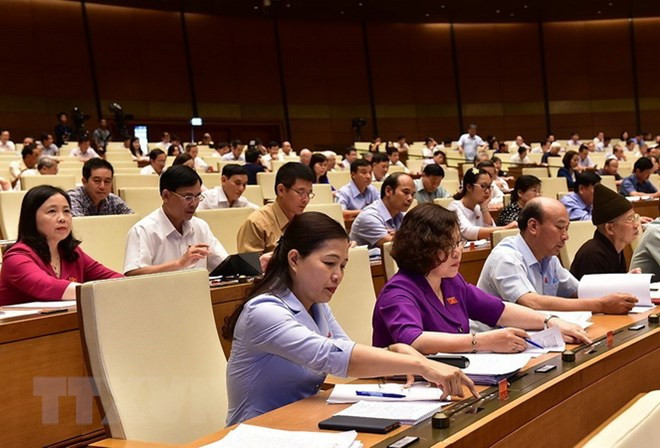The Law on Cyber Security was approved with 86.86 percent of votes.
It has 7 chapters and 43 articles, regulating activities to protectnational security and ensure social order and safety on cyberspace, andresponsibilities of agencies, organisations and individuals concerned.
Before voting, the NA heard areport delivered by Chairman of the NA Committee for National Defence andSecurity Vo Trong Viet on the revisions made to the draft law based on NAdeputies’ opinions.
The Chairman said the revisions include stipulations that agencies andorganisations have the responsibility to verify information when users registerdigital accounts, while the building of a mechanism to verify information isthe responsibility of the Ministry of Public Security.
The revisions also clearly say the provision of information is to servethe investigation and handling of violations of laws on cyber security.
On the stipulation that enterprises must store important data of serviceusers in Vietnam, Chairman Viet pointed out that at present 18 member countriesof the WTO including the US, Canada, Australia, Germany and France had requiredthe storage of data inside their territories.
Furthermore, the stipulation in this law is not the first one inVietnam, he said, elaborating that Decree 72/2013/ND-CP of the Government hasregulated that organisations and enterprises that establish news websites andsocial networks, or provide content on mobile phone networks and electronicgame services must have at least one server system based in Vietnam to servethe inspection, check, storage and provision of information at the request of authorizedstate management agencies and the settlement of customers’ complaints.
With 95.28 percent of approval votes, the NA passed the Law onCompetition (revised), which has 10 chapters and 118 articles.
The law will take effect as of July 1, 2019.
Meanwhile, the Law on Denunciation (revised) was adopted with 96.1percent of votes.
The revised law prescribes that denunciation can be made in the form ofwritten petitions or at face-to-face meetings at authorized agencies andorganisations.
For denunciations made in other forms, if they contain clear contentsabout persons committing law violations along with specific documents andevidence, the receiving agency must conduct checks and inspections and handlethe denunciations in accordance with its authority or transfer them to authorizedagencies and organisations in order not to miss out on violations (Article 25).
On the protection of whistleblowers, the law prescribes the protectionof their personal information, working positions, jobs, life, health, assets,honour, dignity, as well as working positions, jobs, life, health, assets,honour, dignity of their spouses, parents, adoptive parents, children and adoptivechildren.
The revised Law on Denunciations will take effect on January 1,2019.-VNA





























